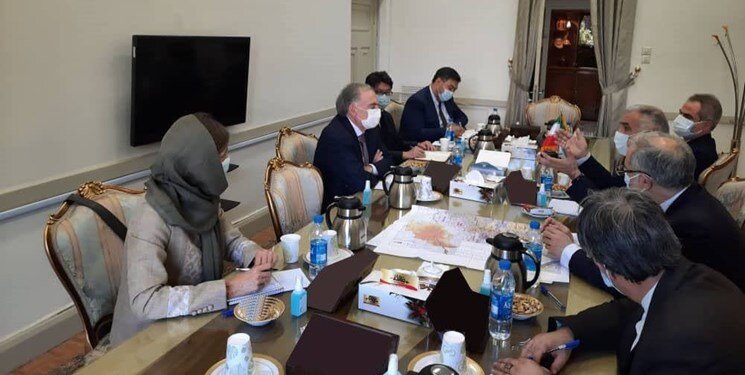UN envoy holds talks on Afghanistan in Tehran

TEHRAN – UN Secretary-General's Personal Envoy on Afghanistan Jean Arnault discussed on Monday issues related to the latest developments in Afghanistan.
Heading a UN delegation, Arnault met with Mohammad Ebrahim Taherian, Iran’s special envoy for Afghanistan.
During the meeting, the current developments in Afghanistan, including the dialogue process and the security situation in the country, were discussed.
Pointing out that Iran considers peace and security in Afghanistan as peace and security in the Islamic Republic, Taherian expressed Tehran’s support for the Afghan-owned and Afghan-led peace process.
He also said Iran is ready to cooperate in facilitating and advancing intra-Afghan dialogue, according to Fars News. The special envoy also insisted on the need to preserve the achievements of the Afghan people over the past two decades.
The two sides also expressed concern about the escalation of violence in Afghanistan in recent months and called for a reduction in violence and the prevention of civilian casualties.
Iran has long voiced support for the Afghan peace talks while stressing the necessity for these talks to be owned and led by the Afghans themselves.
Last week, during his weekly press conference, spokesman for Iran’s Foreign Ministry Saeed Khatibzadeh said Tehran’s diplomatic efforts are focused on bringing peace and prosperity to Afghanistan.
“The future of Afghanistan and its prosperity and peace and stability in Afghanistan has always been the main focus of our consultations,” he said.
Iran has ratcheted up its diplomatic efforts to push forward the Afghan peace process. Seyed Rasoul Mousavi, the director of the Southern Asia Bureau at the Iranian Foreign Ministry, recently paid a 10-day visit to Afghanistan to discuss the peace process.
During his visit to Afghanistan, Mousavi discussed ways to expand political and diplomatic relations and reviewed the current situation in Afghanistan and met with the Afghan Foreign Ministry and government officials. He stressed in the meetings that Iran will continue to stand by Afghanistan and continue its friendly activities.
“Now, after the withdrawal of the occupying forces from Afghanistan, a new development has taken place in this country, and its construction depends on how the government and the people of the country use this opportunity. It is not a question of the presence of a military power that dominates the people, it is important which group or faction can gain the trust of the people and rule the hearts of the people,” Mousavi told the Afghan service of Fars News.
According to Mousavi, Afghanistan needs to reach a national consensus and what guarantees the future of the country.
“In the Doha process, it seems that the U.S. and the Taliban have reached a greater agreement than what is stated in the text of the agreement, and the Taliban attach special importance to this agreement and consider the Doha Accords as the basis for future negotiations. In the Doha negotiations, there are issues that have not yet been released but are important to the Taliban,” he continued.
“For a national consensus, the trust that has been developed between the United States and the Taliban needs to be transferred to the government, political figures, Mujahidin and the people, and the future of Afghanistan should not be based on the U.S. agreement, but on the intra-Afghan agreement,” Mousavi noted.
Pointing to the Istanbul conference, he said, “During the trip to Afghanistan and discussions with the ambassadors of different countries and the United Nations representative in Afghanistan and before, [we concluded that] it seems that the Istanbul meeting may not take place because they did not give an independent identity to this meeting and considered this meeting as a continuation of the Doha meeting in Qatar. When nothing new is unveiled and the United Nations does not play a more serious role in the Afghan peace process, all meetings are like the Doha meeting and will make no difference.”
Mousavi pointed out, “If you look at the role of the United Nations in the current peace process, it claims that it can invite others to the Istanbul summit alongside Qatar and Turkey, but UNAMA's activities in Afghanistan are based on Chapter VI of the UN Charter. Chapter VI of the UN Charter is based on humanitarian services, reconstruction and issues that do not form the basis of responsibility for the peace process, and the resolution that formed UNAMA is a post-Bonn resolution based on ostracizing the Taliban. UNAMA is structured in such an atmosphere.”
The Iranian diplomat noted, “Now that the Taliban are invited to participate in the future of Afghanistan, we must have a new order for the United Nations in Afghanistan, which is in the framework of Chapter VII of the Charter. If dozens of other meetings are held in different cities, but if there is no new agenda, it is not possible to hope for negotiations and the Doha process will continue.”
He stated, “The United Nations should take a fresh look at Afghanistan and issue a resolution under Chapter VII, appointing a special envoy to examine the peace process in a special way.”
SM/PA
